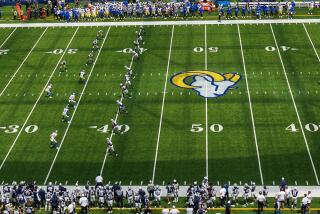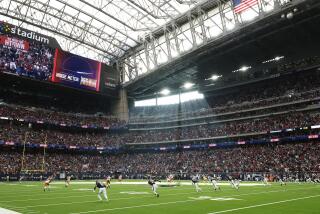No More ‘Discernible’ Stop, So Balks Will Be Balks Again
- Share via
NEW YORK — The balk rules that bogged down baseball last season have come to a discernible stop.
The changes that led to a record 924 balks--up from 356 the previous year--are being dropped, Major League Baseball announced Friday. From now on, balks will be called as they were before 1988.
No longer will pitchers be required to make a “discernible” stop in the set position. Also, pitchers no longer must have both feet on the ground when they set.
“Prior to 1988, the rule stated that a pitcher must come to a stop,” said Richie Phillips, executive director of the Major League Umpires Assn. “The word discernible is being deleted. Also, in 1988, they added change-of-direction does not constitute a stop. That is also being deleted, leaving open the question of whether change-of-direction constitutes a stop.”
The clarifications were adopted in December, 1987, on a 1-year trial basis. The Major League Baseball Players Assn., which has the right to approve or veto such changes, opposed the newer language. Baseball’s rules committee made it official Thursday.
Along with balk changes, the rules committee agreed to act on a recommendation by the scoring rules committee to drop the game-winning RBI as an official statistic. The GWRBI was adopted by the committee in 1979 and went into effect in 1980.
The rules committee will also establish standards for the type of finish on bats and set standards for the size of manufacturers’ logos on equipment.
“We thought that the (balk) change, both in enforcement and language, was inappropriate and likely to force changes in the game that nobody wanted,” Don Fehr, executive director of the players’ union, said.
“The balk rule is to be enforced in 1989 as it was in 1987 and in earlier years,” Fehr said. “I expect that to be the case. I expect there will be good faith.”
But the squawking about balking could continue.
“They took the word discernible out, but you still have to come to a complete stop. We’re telling umpires that,” said Ed Vargo, supervisor of National League umpires. “It’s going to come down to judgment from the umpires. I guess we enforced it before.”
Marty Springstead, supervisor of American League umpires, said this week’s change “doesn’t really mean much.”
“I think at the end of the season, they were all pretty much coming to a stop. That’s the way it was meant to be anyway,” he said.
Bill Murray, of the commissioner’s office and chairman of the rules committee, said, “I’m sure the umpires will call what they see.
“There was a noticeable decline in the number of balks during the second half or the last third of the season,” Murray said. “The pitchers became used to what the umpires were calling.”
There were 253 balks in April, 190 in May and 142 in June. In September and October, a total of 106 were called.
Overall, 558 balks were called in the American League and 366 in the National League.
The Oakland Athletics had 3 of the top violators. Dave Stewart set a single-season record with 16 balks. Bob Welch was next with 13, and Rick Honeycutt tied the American League single-game record with 4.
Dennis Martinez and Pascual Perez of the Montreal Expos and David Cone of the New York Mets were tied for the National League lead with 10.
More to Read
Go beyond the scoreboard
Get the latest on L.A.'s teams in the daily Sports Report newsletter.
You may occasionally receive promotional content from the Los Angeles Times.










